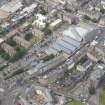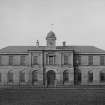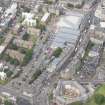Pricing Change
New pricing for orders of material from this site will come into place shortly. Charges for supply of digital images, digitisation on demand, prints and licensing will be altered.
Upcoming Maintenance
Please be advised that this website will undergo scheduled maintenance on the following dates:
Thursday, 9 January: 11:00 AM - 3:00 PM
Thursday, 23 January: 11:00 AM - 3:00 PM
Thursday, 30 January: 11:00 AM - 3:00 PM
During these times, some functionality such as image purchasing may be temporarily unavailable. We apologise for any inconvenience this may cause.
Edinburgh, St Andrew Place, Leith Academy Primary School
School (16th Century)
Site Name Edinburgh, St Andrew Place, Leith Academy Primary School
Classification School (16th Century)
Alternative Name(s) Leith Academy; Leith High School
Canmore ID 152354
Site Number NT27NE 571
NGR NT 27158 75891
Datum OSGB36 - NGR
Permalink http://canmore.org.uk/site/152354
- Council Edinburgh, City Of
- Parish Edinburgh (Edinburgh, City Of)
- Former Region Lothian
- Former District City Of Edinburgh
- Former County Midlothian
NT27NE 571 27158 75891
Edinburgh, Leith Academy Primary School.
ARCHITECT:
George Craig [proposed reconstruction for Leith Academy] 1895-8.
Robert Burn [?] 1804-6, former building demolished 1896.
Publication Account (1981)
The first reference to a gramnar school in Leith occurs in Edinburgh Town Council Records in 1521 (McAra, 1960, 2). The school after 1560 fell into the care of the Kirk Session and by 1623 is known to have occupied the vaults of Old Trinity House. In the J650s, for brief periods, Cromwellian troops occupied the house and scholars were forced to meet in a loft above a soaphouse in St.Andrews Street. This move was temporary and in 1657, the school was once again convened in the Old Trinity House. In 1710 a new school was erected in the south-west corner of the churchyard, but by the end of the century complaints were made about the damp condition of the structure (McKay, 1934, 12, 19). Another school was subsequently built in the Links in 1806.
Information from ‘Historic Edinburgh, Canongate and Leith: The Archaeological Implications of Development’ (1981).
Project (1997)
The Public Monuments and Sculpture Association (http://www.pmsa.org.uk/) set up a National Recording Project in 1997 with the aim of making a survey of public monuments and sculpture in Britain ranging from medieval monuments to the most contemporary works. Information from the Edinburgh project was added to the RCAHMS database in October 2010 and again in 2012.
The PMSA (Public Monuments and Sculpture Association) Edinburgh Sculpture Project has been supported by Eastern Photocolour, Edinburgh College of Art, the Edinburgh World Heritage Trust, Historic Scotland, the Hope Scott Trust, The Old Edinburgh Club, the Pilgrim Trust, the RCAHMS, and the Scottish Archive Network.
Field Visit (10 February 2002)
Foundation stone consisting of the above inscriptions and, at the top, a carving of a three-masted sailing ship.
Inspected By : I. C. Grant
Inscriptions : Below relief of ship, within scroll (raised letters): PERSEVERE
Below scroll (incised letters): LEITH SCHOOL BOARD / LEITH ACADEMY AND TECHNICAL COLLEGE / FOUNDATION STONE OF THIS BUILDING / LAID BY / ROBERT SOMERVILLE ESQ JP / ON 2ND MAY 1896 / SCHOOL FORMALLY OPENED BY / THE RIGHT HON LORD REAY CCIE CCSI / (CHAIRMAN OF THE LONDON SCHOOL BOARD) / ON 22ND OCTOBER 1898 / GEORGE CRAIG ARCHITECT
Signatures : None
Design period : 1895-1898
Year of unveiling : 1898
Unveiling details : 22 October 1898
Information from Public Monuments and Sculpture Association (PMSA Work Ref : EDIN1031)
Archaeological Evaluation (13 February 2015 - 19 February 2015)
A programme of archaeological monitoring was carried out in order to satisfy a requirement for archaeological mitigation stipulated by the City of Edinburgh Council Archaeological Service (CECAS) prior to the construction of a new nursery building within the grounds of Leith Primary School. The programme of works comprised the monitoring of all ground works associated with the laying of service pipes across the site plus monitoring the excavation of 32 footprint pads that will form the foundation of the new development.
The service pipe excavations comprised a series of five interconnected trenches located to the south-east of the school building. The trenches were excavated to between 0.4m and 1.8m deep revealing several layers of material overlying the geological subsoil. The majority of these layers proved to be the result of 19th/20th century disturbance or of modern origin. The only layer of any significance was a sand subsoil recorded close to the base of two of the trenches immediately above the geological beach deposits. The subsoil included a number of disarticulated sheep/goat bones at a depth of 1.3m and was thought to represent the remains of a post-medieval cultivation soil. A series of 32 footprint pads were also monitored as part of the archaeological works. These pads were excavated to a maximum depth of 0.6m wih no features or arefacts of archaeological significance identified.
Funder: Edindurgh City Council,
Headland Archaeology Ltd.
Standing Building Recording (June 2015)
An historic building survey was undertaken by CFA Archaeology Ltd at Leith Academy Primary School, Edinburgh (NGR: NT 27138 75899, Fig. 1) during June 2015. The work was commissioned by the City of Edinburgh Council. John Lawson at the City of Edinburgh Council Archaeology Service (CECAS) requested that a Level 2 building survey be carried out on the redundant boiler house, chimney and canopy prior to their demolition.
The Level 2 standing building survey has recorded the architectural character and plan form of the boiler house, chimney and canopy. A passage running between the boiler house an primary school was recorded. The boiler room contained a coke bunker. No evidence survived showing where the boiler stood but it was believed to have been close to the base of the chimney stack. The boiler house was constructed around the chimney c.1898. It is recommended that no further work is required prior to its demolition, although it is recognised that the decision for any further recording work lies with CECAS.
Funder: City of Edinburgh Council
CFA Archaeology Ltd
Information from Mike Cressey (CFA Archaeology Ltd) July 2015. OASIS-ID: cfaarcha1-215840
Watching Brief (16 June 2015 - 1 September 2015)
An archaeological watching brief was carried out during ground-works for a playground extension at Leith Academy Primary School. The watching brief was required because the playground extension lay in close proximity to the former Victorian Mission Hall (now a boxing club) where a pit was previously discovered and contained a number of 15th century burials. However the watching brief only identified a few stone setts immediately beneath the modern tarmac which indicated the presence of an earlier cobbled surface. No other archaeological features or deposits were revealed.
Informatipn from Magnus Kirby (CFA Archaeology Ltd) September 2016. OASIS ID: cfaarcha1-267838












































































































































